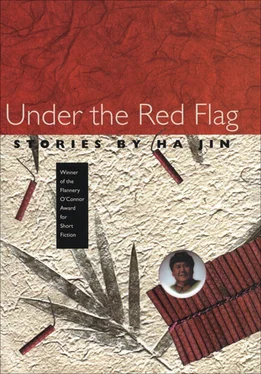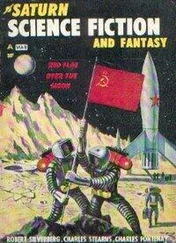As for Lu, he felt things were fine. Losing his testicles didn’t differ much from being sterilized by the family-planning team. Quite a few men in the village were emasculated that way, and the only difference was that they carried more weight below their bellies. Let others babble whatever they liked. Yes, he was gelded, but he had a son, who was as strong as a bear cub, to carry on his family line. From now on that devil of a penis would cause no trouble, and his family would enjoy peace and unity, which would surely lead to security and prosperity. Though he sweated more than before while working in the fields, he felt his back never so straight and his body never so sturdy. People noticed his face glowing with ruddy health and his hair turning darker and thicker. He did so well that the villagers elected him an exemplary commune member. Secretary Zhao even had a heart-to-heart talk with him and encouraged him to write an application for Party membership, which Lu was, of course, delighted to do. Most significant of all, he had a new, normal life.
I left the countryside twelve years ago when my father was transferred to an artillery division in Dalian. Ever since then we have lived in the city. If my aunt were not in Dismount Fort, I might have forgotten that small town where I went to elementary school only for two years in the late 1960s. My aunt comes to visit us every fall, helping Mother prepare our winter clothes and pickle vegetables. Once in a while she brings that town back to my memory.
Last summer I went to Dismount Fort for the first time after a decade. The town was smaller than I had thought. Every street seemed shorter than it had been. On the first day, I rode my uncle’s Peacock bicycle to the marketplace, the Blue Brook, the Eastern Bridge, White Mansion—our classroom building, and other places that I still remembered. But the distances between them were so short I visited them all in less than two hours. From the second day on I gave up the bicycle, and instead I walked around. Few people knew me, because my family had never lived in the town and I had stayed at my aunt’s when going to school there. After strolling through the streets, I found the town basically the same, and the only difference was that there were fewer children now. I stopped at some houses where my former classmates had lived, but they had all left, working in nearby counties and cities. Most girls had become textile workers in Gold County. Their parents didn’t remember me. There was only one boy who had not left and whose mother still knew me, but he was jailed for raping two women.
Life in the countryside was dull. There was nothing going on in the evenings. After supper most people would sit outside, chatting away and fanning themselves until the cool breeze came from the Yellow Sea around midnight. I missed my boyfriend, who was my classmate at the college. He stayed with his parents in Tianjin during the summer. At night I would write to him. If tired of writing, I read Turgenev’s Smoke and a current issue of Youth , a small literary magazine published in Shenyang, which carried a story of mine. Since I had time, I read the whole issue from cover to cover. I didn’t like most of the pieces in it, but there was a narrative poem that aroused my interest. The poem tells a story from a former Red Guard’s point of view. At the beginning of the Cultural Revolution a teenage boy together with his classmates paraded their teacher, an old man, through the streets. The boy kicked the teacher hard and broke his ribs. For the following years he was full of remorse and tried to make up for what he had done. Then the teacher fell ill, and the boy, a young man now, looked after him for five months until the old man died with gratitude. I didn’t like the sentiment of the poem, but it reminded me of a young woman teacher, Zhu Wenli, who had taught me at the Central Elementary School in Dismount Fort eleven years before.
I was in the fourth grade when she came to our school. At a glance you could tell she was a recent college graduate. She looked shy and timid. In the beginning, whenever she spoke, not only her cheeks but also her ears turned red. She was a charming young woman, tall and slender, her hands very delicate with long, thin fingers. Her dark eyes were as sensitive as though they were always ready to be in tears. At that time, in the middle of the revolution, we had no sense of beauty. As one of the slogans says: “Sweet flowers are poisonous.” To us, Wenli was someone dangerous rather than pretty. But I remember I liked looking at her in profile; in that way she reminded me of the ballerinas in the revolutionary model play The Red Women Detachment . Certainly Wenli never wore a uniform; besides, her lips were thicker and the tip of her small nose too round, lacking the stern looks of a woman soldier.
She taught music in her first year. The class mainly consisted of two parts: the songs praising Chairman Mao or composed for the quotations from him; the dances expressing our loyalty to the Chairman and the Party. Though she was knowledgeable about music and was even able to compose a song, Wenli’s voice was much too soft and too weak for those revolutionary songs. We believed we sang better than she, because our voices were more sincere and passionate. But she was a wonderful dancer. Standing on one toe, she could raise the other leg slowly back and forth with ease, as if it had no weight. She could stretch out her arms with a lot of grace and poise. We all enjoyed watching her dance, though she didn’t seem to have the strength for a loyalty dance, the vigorous kind we did on the streets. Soon we learned that she came from a capitalist family in Shanghai. No wonder she looked so delicate and fragile.
One day at noon, Niu Fen and I went to see Miao Jian, the teacher in charge of our class, whose office was on the second floor in White Mansion. On the last flight of the stairs we heard someone singing. The slow, dangling tune was so different from anything we had heard that both of us stopped to listen. It was Wenli’s voice. Gradually we took in the words:
Why are flowers so red?
So red and so beautiful?
O so red, O so beautiful,
Like a fire,
Like a fire
That burns the blood
Of youth and love—
The wind must have blown open the door of her office. She stopped. Niu Fen and I entered the corridor and found Wenli holding the doorknob. She saw us and smiled nervously, her lips twitching slightly and her eyes full of sparkling tears.
“Can I help you, Aina?” she asked me. I shook my head, too confused by her tearful eyes to say anything. One of my bobby pins came loose and I stuck it back in my hair.
“What’s that song, Teacher Zhu?” Niu Fen, who was a loudmouth, asked.
“A Uigur folk song,” Wenli said. “I, I sang it just for fun.”
I don’t know whether Niu Fen reported Wenli to the school leaders. After that, I never heard her sing the song again, and she only sang the revolutionary songs she taught us in class. But somehow the tune of that folk song remained in my mind; from time to time it rose in my ears. Later I came upon its music and words at a friend’s home in Dalian and learned to sing it myself.
Our class teacher Maio Jian was a young man. Some people called him “Little Albanian,” because of his big round eyes, aquiline nose, and small stature. In no way did he look Chinese. His face was very lean and he had to shave every day to keep his whiskers down. It was said that he had mixed blood. People thought him handsome, perhaps because he looked exotic. I had no idea when he and Wenli started their love affair. In any case, we soon noticed they were often together. Later Wenli had appendicitis and was operated upon. During her recovery Miao visited her every day.
Читать дальше












